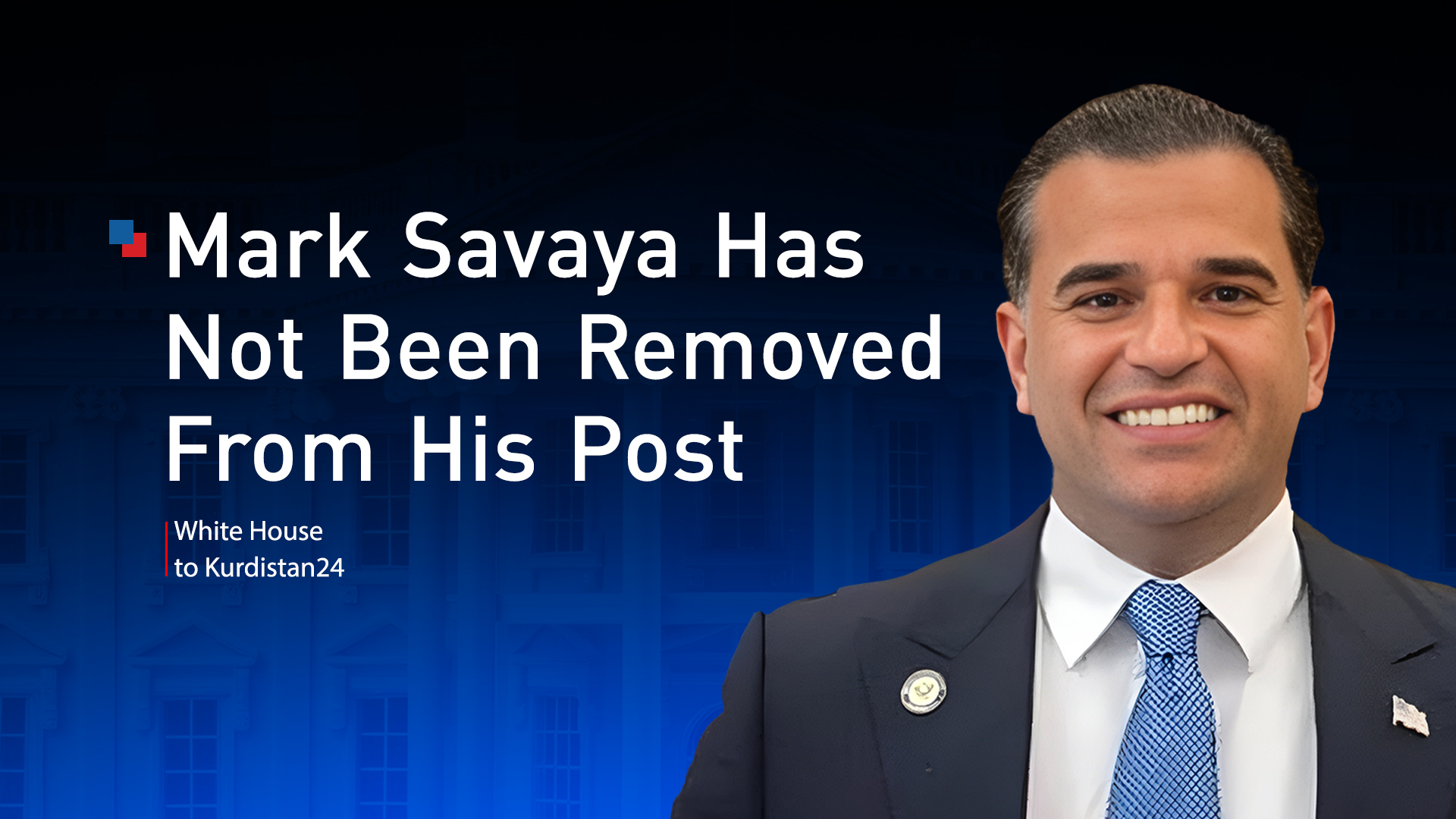White House to Kurdistan24: Mark Savaya Has Not Been Removed from His Post
A senior White House official told Kurdistan24 that reports of U.S. envoy Mark Savaya’s removal are false. Savaya reiterated US support for Iraq's sovereignty and opposition to external interference in government formation.

ERBIL (Kurdistan24) - A senior White House official has confirmed to Kurdistan24 that recent reports about the removal of Mark Savaya from his role as the United States Special Envoy to Iraq are false, describing the claims as baseless and inaccurate.
Speaking exclusively on Friday evening, November 21, 2025, the high-level official — who requested not to be named — said:
“We reject the rumors suggesting Mark Savaya’s dismissal from his position as President Trump’s envoy to Iraq. These reports have no foundation.”
The clarification comes amid growing speculation on social media regarding Savaya’s status. The envoy himself posted a clear message on his official X page:
“I look forward to visiting Iraq soon and meeting with the key leaders. Iraq has made significant progress over the past three years, and we hope to see this progress continue in the coming months. At the same time, we are carefully watching the process of forming the new government. Let it be clear that the United States will not accept or permit any outside interference in shaping the new Iraqi government.”
I look forward to visiting Iraq soon and meeting with the key leaders.
— Mark Savaya (@Mark_Savaya) November 21, 2025
Iraq has made significant progress over the past three years, and we hope to see this progress continue in the coming months. At the same time, we are carefully watching the process of forming the new…
These reassurances follow President Donald Trump’s message on Oct. 20, 2025, posted on X, in which he reiterated his full confidence in Savaya.
Trump wrote:
“I’m pleased to announce Mark Savaya will serve as Special Envoy to the Republic of Iraq. Mark’s deep understanding of the Iraq-U.S. relationship, and his connections in the region, will help advance the interests of the American people. Mark was a key player in my campaign in Michigan, where he, and others, helped secure a record vote with Muslim Americans. Congratulations, Mark!”
Donald J. Trump Truth Social Post 02:56 PM EST 10/19/25
— Commentary Donald J. Trump Posts From Truth Social (@TrumpDailyPosts) October 19, 2025
I’m pleased to announce Mark Savaya will serve as Special Envoy to the Republic of Iraq. Mark’s deep understanding of the Iraq-U.S. relationship, and his connections in the region, will help advance the interests of the…
The rejection of the rumors regarding Savaya’s post coincides with Washington’s expanding engagement in Iraq. On November 7, 2025, Savaya issued a public statement highlighting the United States’ strategic partnership with Baghdad, underlining efforts to support Iraq’s development into a “strong, independent, and militia-free state.”
In a message on his official X account, Savaya praised the resilience and talent of the Iraqi people, calling them the nation’s “most valuable resource.”
He wrote:
“Iraq’s future looks bright thanks to its talented and vibrant people, the most valuable resource any nation has. In recent years, Iraq has made significant progress. As the country prepares for a pivotal moment in its democratic process, let’s maintain the momentum. The United States stands with Iraq as it moves forward: strong, independent, and free from foreign-backed militias.”
Iraq’s future looks bright thanks to its talented and vibrant people, the most valuable resource any nation has.
— Mark Savaya (@Mark_Savaya) November 7, 2025
In recent years, Iraq has made significant progress. As the country prepares for a pivotal moment in its democratic process, let’s maintain the momentum.
The… pic.twitter.com/gikvXddGjN
His statement also followed his endorsement of the Iraq–Turkey water management agreement, signed on November 3. Savaya described the accord as a “milestone for regional cooperation”, commending both countries for their readiness to collaborate on long-standing water disputes.
The agreement emerged at a time when Iraq faces an escalating water crisis. Reduced river flows, outdated infrastructure, and accelerating climate change have pushed the country toward an environmental emergency. Prime Minister Mohammed Shia al-Sudani recently warned that Iraq’s reservoirs are “rapidly drying up” and emphasized that the water crisis is “real” and severe.
Environmental assessments indicate that millions of Iraqis are already affected by water scarcity, with the United Nations estimating at least seven million people experiencing dire shortages. The southern marshlands — once a UNESCO heritage site — have dramatically shrunk, threatening communities dependent on agriculture, fishing, and buffalo herding.
OFFICIAL STATEMENT
— Mark Savaya (@Mark_Savaya) November 3, 2025
Congratulations to both nations: The Republic of Iraq and the Republic of Turkey.
I commend the Government of Iraq and applaud the agreement reached between the Republic of Iraq and the Republic of Turkey to address ongoing water management issues between… pic.twitter.com/9MjuIYWR9Z
Savaya’s support for the new agreement reflects Washington’s broader vision of helping Iraq address structural challenges, from water security to governance, while encouraging independence from foreign-backed armed groups.
The combined statements from the White House and Savaya underscore a unified U.S. position:
the envoy remains in office, and Washington’s diplomatic engagement in Iraq is accelerating rather than retreating.
As Iraq approaches a decisive stage in its political process, the White House views Savaya’s role as central to maintaining steady dialogue with Baghdad on political, economic, and environmental fronts.
With the rumors now firmly denied, U.S. officials emphasize that their partnership with Iraq continues to be guided by commitments to sovereignty, stability, and the strengthening of state institutions free from militia influence.